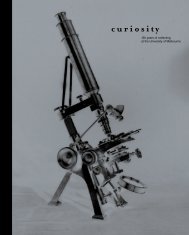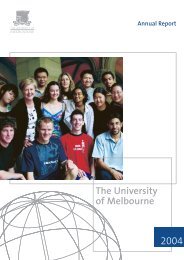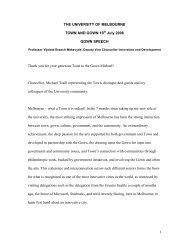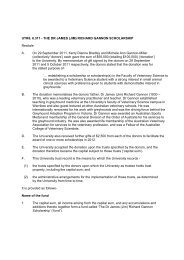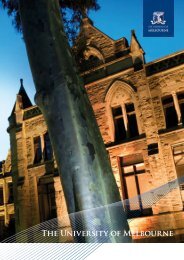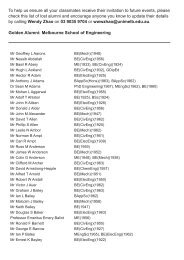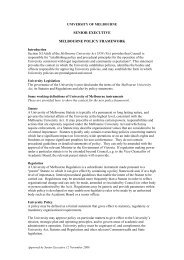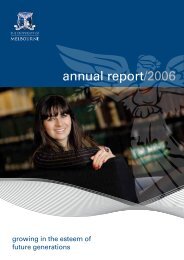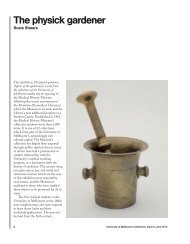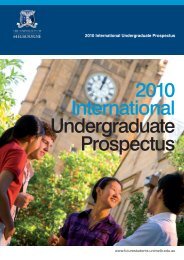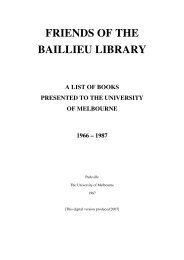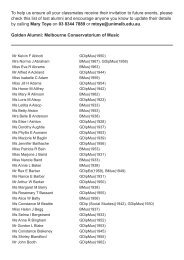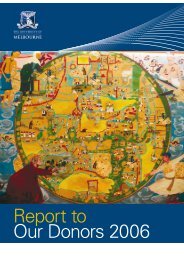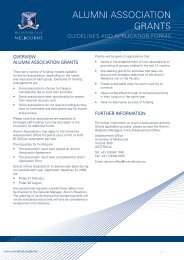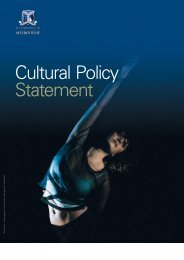2007 Annual report (PDF 8.1 Mb) - University of Melbourne
2007 Annual report (PDF 8.1 Mb) - University of Melbourne
2007 Annual report (PDF 8.1 Mb) - University of Melbourne
Create successful ePaper yourself
Turn your PDF publications into a flip-book with our unique Google optimized e-Paper software.
INTERNATIONAL<br />
ENGAGEMENT<br />
and engaged institution. Asialink also assists<br />
in the coordination <strong>of</strong> many <strong>University</strong>-wide<br />
Asia related programs and activities.<br />
One <strong>of</strong> the highlights <strong>of</strong> <strong>2007</strong> was the<br />
prestigious ‘APEC 2020 – Asialink<br />
Conversation for Leaders’ held in Sydney<br />
immediately following the APEC Leaders<br />
Summit. With keynote speaker Indonesian<br />
President Susilo Bambang Yudhoyono,<br />
40 leaders from business, government,<br />
think tanks and academia from 21 APEC<br />
economies discussed contemporary issues<br />
facing the region such as regional architecture,<br />
capacity building and climate change.<br />
Regional Initiatives<br />
The Asia-Australia Mental Health (AAMH)<br />
network, a partnership with the <strong>University</strong>’s<br />
Department <strong>of</strong> Psychiatry, the Centre for<br />
International Mental Health, the Australian<br />
International Health Institute, St Vincent’s<br />
Health and Asialink continued to collaborate<br />
on culturally appropriate responses to<br />
escalating mental health challenges in<br />
the Asia region. AAMH projects included<br />
disaster-related mental health care to<br />
protect children and facilitating collaboration<br />
between Beyondblue, Australia’s national<br />
depression initiative, and China’s Psychiatric<br />
Association aimed at raising community<br />
awareness in China about depression.<br />
In another regional initiative, the<br />
<strong>University</strong>’s Asia Institute is leading a<br />
consortium <strong>of</strong> eight Australian and four<br />
Indonesian Universities in a collaborative<br />
program to help re-build research capacities<br />
in the devastated Indonesian province <strong>of</strong><br />
Aceh. This is a three-year research program<br />
which has been supported by grants <strong>of</strong><br />
$3 million from AusAID and the Myer<br />
Foundation, and involves staff from a wide<br />
range <strong>of</strong> disciplines.<br />
Outlook<br />
2008 will see the opening <strong>of</strong> two new<br />
<strong>of</strong>fshore <strong>of</strong>fices in San Francisco and<br />
Shanghai, bringing the <strong>University</strong>’s network<br />
<strong>of</strong> <strong>of</strong>fshore <strong>of</strong>fices to seven. The <strong>University</strong><br />
will work through these <strong>of</strong>fices and other<br />
means to promote the new graduate<br />
schools internationally and to promote the<br />
split PhD in Malaysia. The support <strong>of</strong> the<br />
new San Francisco <strong>of</strong>fice will be particularly<br />
useful in engagement with partner<br />
universities in North America. An Australia<br />
India Institute will be established to provide<br />
regional perspective on relations between<br />
the two countries as well as enhancing<br />
inter-governmental relations, collaborative<br />
research links and strategic alliances with<br />
leading institutions. The <strong>University</strong> will also<br />
work to further enhance the contribution<br />
made by the Confucius Institute to<br />
strengthen Australia-China relationships.<br />
Radhika Coomaraswamy delivered the <strong>2007</strong> Chancellor’s<br />
Human Rights Lecture, titled “The protection <strong>of</strong><br />
women and children during armed conflict. Whose<br />
responsibility?”.<br />
ASIALINK – QUICK FACTS<br />
Conferences<br />
> ‘Linking Latitudes India.’ Nearly 300<br />
Australian educators travelled to India<br />
for a conference in Delhi and Agra and a<br />
two-week fieldwork program.<br />
> ‘Asia Connect,’ a one-day conference<br />
which focused on the opportunities and<br />
the war for talent in Asia.<br />
> Program <strong>of</strong> public and private events at the<br />
<strong>University</strong>. Asia-focused public lectures<br />
addressing themes such as climate<br />
change, globalisation, human rights and<br />
security and ‘insider perspectives’ into<br />
countries including Burma, China, India,<br />
Indonesia and Singapore.<br />
> Asialink Ambassadors Roundtables with<br />
Ambassadors from the People’s Republic<br />
<strong>of</strong> China, Korea and Thailand and<br />
Australia’s Ambassadors to Singapore<br />
and Vietnam.<br />
> Business Briefings with eminent speakers.<br />
Arts Program<br />
> Sponsored over 40 artist residencies<br />
throughout Asia (in Visual Arts, Arts<br />
Management, Performing Arts and<br />
Literature).<br />
>Organised six visual arts touring<br />
exhibitions with 30 participating artists.<br />
> Funded three Australian authors to travel<br />
to China and Taiwan.<br />
> Held annual Australia-Asia Arts Forum in<br />
Brisbane with speakers from Australia,<br />
Korea and Singapore.<br />
Education Program<br />
> Sponsored over 200 Australian teachers<br />
on international study programs.<br />
> Hosted 30 Asian educators.<br />
> Sent 50 Australian educators to Asia.<br />
> Delivered a national forum for leading<br />
educators on Engaging Young Australians<br />
with Asia in Australian Schools.<br />
Leaders Program<br />
> Secured major funding from the Potter<br />
Foundation for participant Scholarships.<br />
The <strong>University</strong> <strong>of</strong> <strong>Melbourne</strong> <strong>Annual</strong> Report <strong>2007</strong> 55



